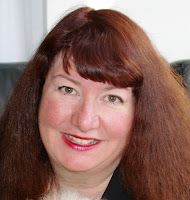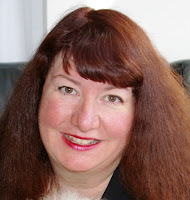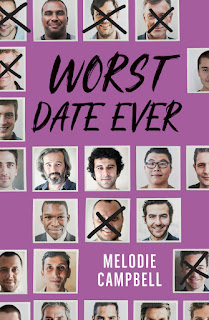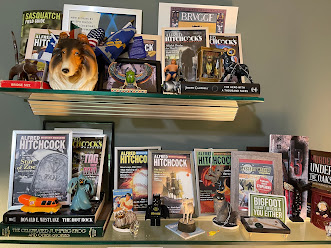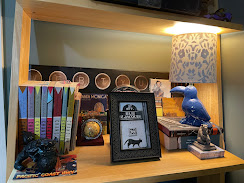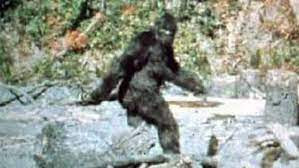Melodie here. No one writes a more entertaining and informative blog
than my pal Anne R. Allen. If you only read one post on writing this
year, make it this one. And if that last example doesn't put a smile on
your face, I'm not Bad Girl. (Which I am.)
Chekhov's Gun - Why It's Important to Fiction Writers
by Anne R. Allen
Anton
Chekhov, the Russian playwright, also wrote short stories, essays and
instructions for young writers. Probably his most famous writerly
advice is this admonition:
"If in the first act you have hung a
pistol on the wall, then in the following one it should be fired.
Otherwise don't put it there."
In other words, remove
everything that has no relevance to the story. If chapter one says your
mild-mannered reporter heroine won a bunch of trophies for archery
which she displays prominently alongside her handmade Mongolian horse
longbow, she better darn well shoot an arrow before the story is done.
"Mood and Setting" Details vs. Chekhov's Gun
Yeah,
but what if that longbow is there to show us what her apartment looks
like? It's good to show her decor, because it gives an insight into her
character, right?
It depends. Yes, we do want to use details to
set tone and give depth to our characters, but the key is how you stress
those details when you first present them.
If there's a whole
paragraph about those archery trophies, or the characters have a
conversation about the Mongolian horse longbow, you need to shoot some
arrows. But if there's just a cursory mention, "her apartment walls
were decorated with an odd assortment of personal trophies and exotic
weapons" then you can leave them on the wall.
So not every
lampshade the author mentions has to show up two chapters later on the
head of a drunken ex-boyfriend, but you need to be careful how much
emphasis you put on that lampshade.
What about Red Herrings?
Wait
a minute - what if you write mysteries? Mysteries need irrelevant
clues and red herrings. Otherwise the story will be over before chapter
seven.
This is true. But mystery writers need to manage
their red herrings. If the deceased met his demise via arrow, probably
shot by a Mongolian horse longbow, then Missy Mild-Mannered Reporter is
going to look like a very viable subject to the local constabulary.
Only we're sure she didn't do it because she's our hero! Okay, that means the longbow and the trophies are red herrings.
But
they still need to be fired. Maybe not like Chekhov's gun, but they
need to come back into the story and be reckoned with. Like maybe the
real killer visited her apartment earlier when delivering pizza, then
broke in to "borrow" the longbow in order to make Missy look like the
murderous archer.
The Chekhov's Gun Rule Applies to Subplots
I've been running into this problem in a lot of fiction lately - both indie and traditionally published.
That's what inspired this post.
I
sometimes find myself flipping through whole chapters that obviously
have nothing to do with the main story. That's because the subplot
isn't hooked in with the main plot. It's just hanging there, not doing
anything.
The subplot has become the unfired Chekhov's gun.
For
instance, one mystery had the protagonist go through endless chapter of
police academy training after the discover of the body. The mysterious
murder wasn't even mentioned for a good six chapters. I kept trying to
figure out how her crush on a fellow aspiring policeperson was going to
solve the mystery.
I finally realized it wasn't going to. None
of the romance stuff had to do with the mystery. When I finally flipped
through to a place where the main plot resumed, the hot fellow student
didn't even make an appearance. He'd already gone off with a hotter
female recruit.
It's fine to have a romance subplot in a mystery -
in fact, that's my favorite kind. But that romance has to take place
while some mystery-solving is going on. And hopefully it will provide
some hindrances to the proceedings, and maybe some comic relief.
But
if that romance doesn't "trigger" a new plot twist or reveal a clue,
then it's an unfired gun on the wall. It's just hanging there, annoying
your reader, who expects it to be relevant.
Naming a Character Creates a Chekhov's Gun
Another "unfired Chekov's gun" situation often comes up with the introduction of minor characters and "spear-carriers."
You
don't want to introduce the pizza delivery guy by telling us how he got
the nickname "Green Arrow" followed by two paragraphs about his archery
expertise - unless he's going to reappear later in the story. And he
better be doing something more archery-related than delivering another
pie with extra pepperoni.
This is a common problem with newbie
fiction. In creative writing courses we're taught to make characters
vivid and alive. So every time you introduce a new character, no matter
how minor, you want to make the memorable. You want to give them names
and create great backstories for them.
Don't give into the urge, no matter what the creative writing teacher in your head is saying.
If
the character is not going to reappear or be involved with the plot or
subplot, don't give him a name. Don't even give him a quirky outfit.
Just call him "the pizza guy" or "the Uber driver" or "the barista."
A named character becomes a Chekhov's gun. The reader will expect that character to come back and do something explosive.
Beward Research-itis
A
lot of unfired guns come from what I call research-itis. That's when
the author did a heckuva lot of research, and goldernit, they're going
to tell you ever single fact they dug up.
You'll get three
chapters on the historical significance of the Mongolian Longbow...and
how Genghis Kahn used a smaller bow...which in the 17th century was
replaced by the Manchu bow...And how the Manchu bows have larder siyahs
and the presence of prominent string bridges...
None of which has anything to do with the dead guy in the living room with the arrow in his back.
If the reader doesn't need to know it to solve the mystery and it's not a red herring, keep it to yourself.
Although
a lot of that research will come in very handy for blogposts and
newsletters when you're marketing the book, so don't delete all those
research notes!
Beta Readers and Editors Can Take Chekhov's Gun Off the Wall
It's
tough to weed out all those unfired guns in your own work. You're sure
you absolutely need to tell us that our heroine won those trophies
when she was on her college archery team where her nemesis, Renee
Rensinger, once stole her glasses before a meet...and she found out she
could shoot better without them and didn't need glasses after all, which
was great because her glasses made her look so dorky and after she
stopped wearing them, Jake Hawkins noticed her for the first time. Jake
turned out to be a creep, but...
Your editor will tell you different. And eventually you will thank her for it.
So will your readers.
BIO
Anne R. Allen (@anneallen) is the author of ten humorous mysteries, plus the bestselling writing guides The Author Blog - Easy Blogging for Busy Authors, and How to Be a Writer in the E-age, co-written with Catherine Ryan Hyde. Anne blogs with NYT bestselling author Ruth Harris at
Anne
R. Allen’s Blog…with Ruth Harris.
The Author Blog
Named
one of the “Best Blogging Books of All Time in 2019, and “Best SEO Books of All
Time in 2021” by Book Authority, this is an easy-does-it guide to simple,
low-tech blogging for authors who want to build a platform, but not let it take
over their lives.
An
author blog doesn't have to follow the rules that monetized business blogs do.
This book teaches the secrets that made Anne R. Allen a multi-award-winning
blogger and one of the top author-bloggers in the industry.
And
you'll learn why having a successful author blog is easier than you think.






